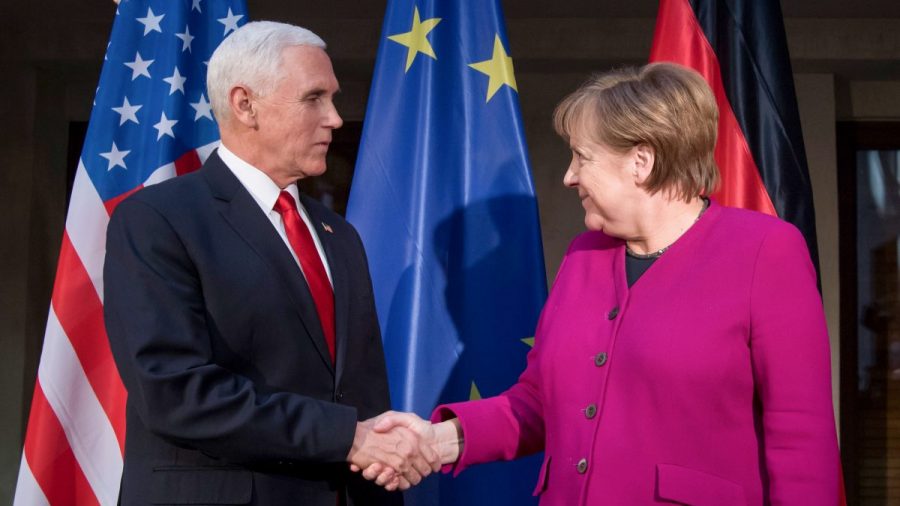Vice President Mike Pence called on European nations on Feb. 16 to support U.S. sanction on Iran and to withdraw from the Iran nuclear deal.
Yet major European players—prominently France, Germany, and Britain—appear unwilling to heed the call amid Europe’s financial entanglements with Iran.
After visiting the holocaust site of the Nazi Auschwitz concentration camp in Poland during his trip, Pence framed Iran’s rhetoric and actions in terms of anti-Semitism.
“When authoritarian regimes breathe out vile, anti-Semitic hatred and threats of violence, we must take them at their word,” he said in his Munich Security Conference speech. “The Iranian regime openly advocates another holocaust and it seeks the means to achieve it.”

Backing the position of President Donald Trump, Pence called Iran “the greatest threat to peace and security in the Middle East,” pointing to its sponsorship of terrorists like Hamas and Hezbollah as well as extremists in Syria and Yemen.
Troubled Deal
Trump announced the United States’ withdrawal from the Iran nuclear deal in May and ordered the reimposing of sanctions.
The deal was signed in 2015 by the Obama administration along with Russia, China, the United Kingdom, France, and Germany. It required Iran to delay its capacity to build a nuclear weapon until 2026 in exchange for sanctions relief.
Trump had criticized the deal for asking too little of Iran, such as by not addressing Iran’s ballistic missile program, financing terrorists, and more.
Evidence has also emerged that Iran negotiated the deal in bad faith.
In April, Israeli Prime Minister Benjamin Netanyahu presented what he said were Iranian documents obtained by Israeli intelligence that proved Iran’s development of nuclear weapons before the 2015 deal, while the regime claimed its nuclear program didn’t seek to build arms.

Moreover, Ali Akbar Salehi, the head of Iran’s atomic agency, said on Jan. 22 that the regime secretly bought components for its heavy water reactor near Arak, a critical component in the production of weapons-grade plutonium, even though the nuclear deal required the regime to disable it.
Iran’s belligerent behavior was supposed to fade away with the nuclear deal, officially called the Joint Comprehensive Plan of Action.
Instead, Iran announced in 2017 an intent to boost its military spending by 150 percent in five years. In recent weeks, it has tested a cruise missile, unveiled a cruise missile-armed submarine, boasted a capability of quickly restarting uranium enrichment, and twice attempted to launch satellites, which use technology similar to intercontinental ballistic missiles. Both attempts failed.
EU Holding On
Pence called on European nations to abandon the Iran deal and join the United States in pressuring the Islamic regime.
“The time has come for our European partners to stop undermining U.S. sanctions against this murderous revolutionary regime. The time has come for our European partners to stand with us and with the Iranian people, our allies and friends in the region,” he said. “The time has come for our European partners to withdraw from the Iran nuclear deal and join us as we bring the economic and diplomatic pressure necessary to give the Iranian people, the region, and the world the peace, security, and freedom they deserve.”
But the United Kingdom, France, and Germany continue to voice their commitment to the deal and even set up a joint company that should facilitate goods bartering between European and Iranian companies without the use of currency, thus dodging the U.S. sanctions. Yet the company is planned to initially only handle trade in food and medical supplies, which are not targeted by the sanctions.

Europe has been much more deeply involved in trading with Iran that the United States.
After the sanctions were lifted in 2015, European trade with Iran nearly tripled, reaching $25 billion in 2017, according to Statista.
Trade between the United States and Iran, on the other hand, ranged between $200 million and $300 million a year.
From The Epoch Times


